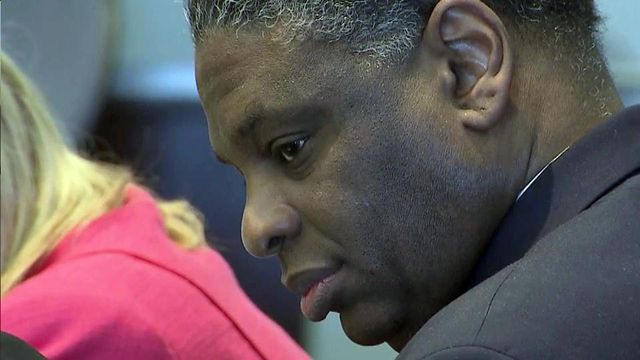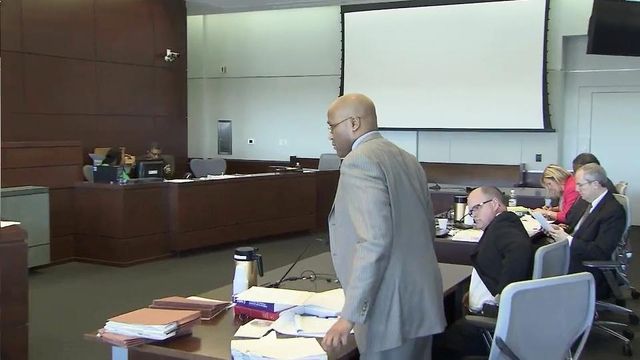Witness: Durham County man was suicidal after killing son
A Durham County man who insists he must have been sleepwalking when he killed his son more than four years ago expressed suicidal thoughts hours after the boy's death, a state psychiatrist testified Friday.
Posted — UpdatedJoseph Anthony Mitchell is charged with first-degree murder and two counts of attempted first-degree murder in the Sept. 22, 2010, strangulation death of 4-year-old Blake and attacks on his older children, Alexis, who was 13 at the time, and Devon, who was 10, in their home.
After attacking the children, Mitchell barricaded himself in a home office and stabbed himself three times in the chest and slit his throat, witnesses have said. Durham County deputies had to break through a door to get to him.
When he awoke at Duke University Hospital, Dr. Grace Thrall conducted a psychiatric evaluation on him. She testified Friday that he was responsive and knew that he had tried to kill himself.
"When asked if he was still wanting to kill himself, he replied yes," Thrall, now a psychiatrist at Central Regional Hospital in Butner, said, reading from a report of the September 2010 exam.
The following day, however, Mitchell denied having suicidal thoughts and didn't even remember talking with Thrall the previous day, she said.
A defense expert, forensic psychiatrist Dr. George Corvin, spent all of Thursday and much of Friday morning on the witness stand to support Mitchell's claim that he wasn't aware of his actions on the night of the attacks.
Corvin said Mitchell was likely suffering from "non-REM parasomnia," a sleep disorder where he could perform random acts unconsciously and could become violent if triggered by a loud noise.
"I think he was in an altered state of consciousness that rendered him unaware of his extensive, specific behaviors for a fairly extended period of time," Corvin testified Friday. "Anything could have been a triggering event, at which point this sort of bizarre but not dangerous behaviors would then convert into bizarre but dangerous behaviors."
Mitchell testified Wednesday that he was in financial distress, having been unemployed for two years and trying to secretly rescue his home from foreclosure, and had gotten little sleep in the weeks leading up to Blake's death.
Corvin, who was the second and final defense witness, said stress and a lack of sleep likely led to the parasomnia, and he said Mitchell was incapable of exercising any criminal intent in carrying out the attacks.
Prosecutors dispute the so-called "sleepwalking defense," saying Mitchell was completely aware of his actions that night and that the family's financial difficulties might have been the motive for the attacks.
Thrall testified that her examination of Mitchell found a man in a state of major depression. She said he had no energy and told her that he rarely showered, wore the same clothes day after day, had gained 30 pounds because of lack of exercise and didn't clean up around the house or yard.
Although she put him on a suicide watch and ordered psychiatric treatment, she noted there was a disconnect between Mitchell's situation and his emotional state.
"I don't think we'd seen a person who had attempted to take their life and was accused of killing a child have such a lack of emotional response to that," she testified.
Prosecutors have one other rebuttal witness, Nancy Laney, a psychologist who examined Mitchell, but they weren't able to to obtain her testimony Friday via Skype – she has been out of the country this week. So, the jury was sent home early, and Laney is expected to testify Monday morning.
Defense attorney Jay Ferguson asked Superior Court Judge James Roberson to give jurors the option of convicting Mitchell of involuntary manslaughter, noting there was evidence that Mitchell could have sought help for his stress and sleep problems to head off the parasomnia and not doing so amounted to negligence. Roberson denied Ferguson's request, saying jurors would have the option of convicting Mitchell only of first- or second-degree murder or acquitting him.
Roberson said he would instruct the jury on the defense of automatism, which involves doing acts unconsciously.
• Credits
Copyright 2024 by Capitol Broadcasting Company. All rights reserved. This material may not be published, broadcast, rewritten or redistributed.






